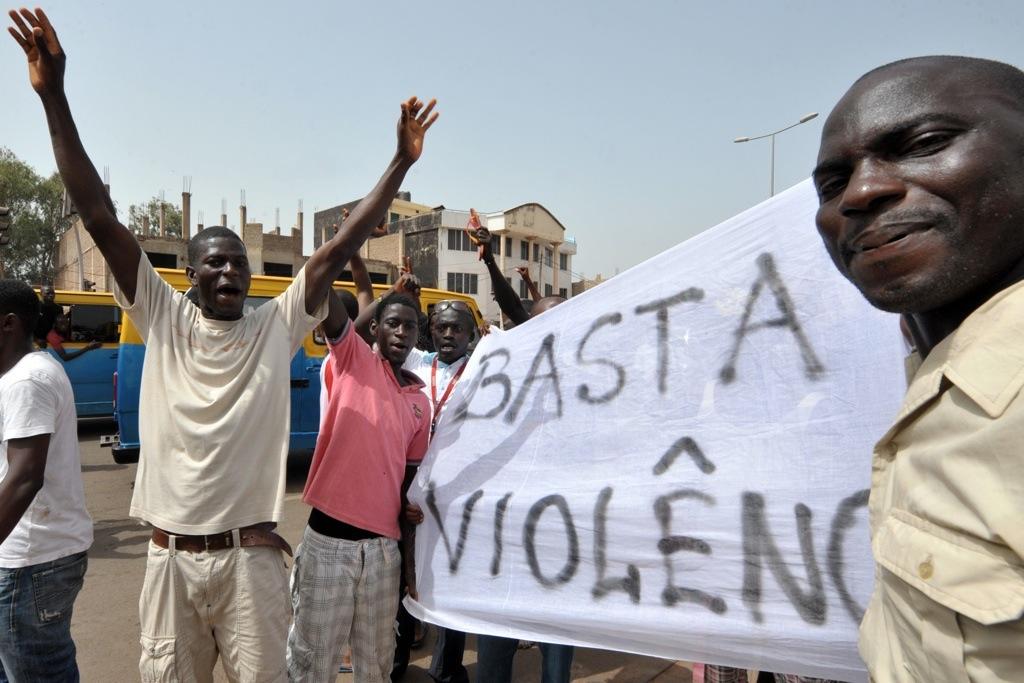West Africa coup update: ECOWAS to the rescue
In Guinea-Bissau, 30 people demonstrate for peace in front of the national assembly, where the negotiations took place on April 15, 2012 in Bissau, before soldiers disperse them. Guinea-Bissau’s opposition vowed reach a power-sharing deal with the junta that seized power in the latest coup to shake the notoriously unstable west African country.
Here's the latest on West Africa's coups in Guinea-Bissau and Mali.
Guinea-Bissau's military junta Monday closed the country's land, sea and air borders with a tough warning that any effort to enter the country would be met with a "military response," reported Reuters, citing a statement read to it by a military officer in the capital, Bissau.
The border closure came as the arrival was expected of a high-level mediation team from the 15-nation Economic Community of West African States (ECOWAS). The negotiation team has prior approval to come to Guinea-Bissau and is expected to meet with the coup's military leaders and the new National Transitional Council, reported AP from Bissau. Kadre Desire Ouedraogo, the president of the ECOWAS commission, is to lead the delegation meeting with junta leaders in Bissau.
ECOWAS has stated the coup is "unacceptable," reported Reuters.
The Guinea-Bissau military seized power on Thursday, April 12, and arrested the interim president, Raimundo Pereira, and the frontrunning candidate, Prime Minister Carlos Gomes Junior in the elections which were to be held on April 29. Both men are reported to be in good condition.
Over the weekend, the military formed a transitional council with a number of Guinea-Bissau's opposition parties, but they left out the ruling party, the PAIGC.
ECOWAS leaders said they are prepared to send troops to Guinea-Bissau to support the transition back to elections, according to AllAfrica.com. That is probably exactly what the coup leaders do not want.
The tiny former Portuguese colony is one of the world's poorest and has been hit by coups and instability. No president has completed a term since independence from Portugal in 1974, reports the BBC.
Recently Guinea-Bissau has been destabilized by the international drug trade, as it has become a transit point for drugs from Latin America that are headed for the European market. The country's weak governance and military have allowed the drug trade to flourish, according to reports.
Further diplomatic pressure on the junta came from the Community of Portuguese-speaking Countries (CPLP), which Guinea-Bissau belongs to, backed the idea of a UN-mandated intervention force to be formed with the cooperation of the African Union and the European Union.
The coastal capital Bissau was also swirling with rumors that a Portuguese warship was on its way to evacuate Portuguese and other foreign nationals, reported Reuters.
More from GlobalPost: Guinea-Bissau: Soldiers arrest Prime Minister Carlos Gomes Junior in apparent coup
The Guinea-Bissau coup interupted an election campaign to replace President Malam Bacai Sanha, who died in a Paris hospital in January after an illness. The military junta apparently objected to the leading candidate, Gomes Junior.
Mali is equally unsettled.
Although the coup leaders there restored constitutional rule last week, by installing the speaker of its legislature as the country's leader, Mali is grappling to deal with the Tuareg rebels in the north, where they control three major cities, including Timbuktu, and have declared the area to be the independent state of Azawad.
A Swiss woman living in Timbuktu was kidnapped Sunday by unidentified gunmen, according to Reuters. The woman, named by residents as Beatrice, was reportedly taken by men wearing turbans. She had lived in Timbuktu for several years and spoke local languages when she tried to convert people to Christianity. The Swiss government said is working to free the woman, reported News24.
ECOWAS is also intervening in Mali. It pressed the military leaders to step down and turn government over to elected leaders. ECOWAS is also preparing to send a regional peacekeeping force of 3,000 to Mali, to support the constitutional rule and to help prevent the Tuareg rebels from establishing a separate state in northern Mali.
The Tuareg rebels said Monday that their first talks with and Malian government officials went well, reported AFP.
"We've had official contact with the Malian delegation that we can describe as positive," said Hamma Ag Mahmoud, a member of the political branch of the Azawad National Liberation Movement (MNLA). Mahmoud spoke to AFP after the meeting late Sunday in Mauritanian capital Nouakchott.
Although he said the MNLA would not give up its declaration of an independent state of Azawad, he said: "Independence can be negotiated within the framework of a Malian federation."
More from GlobalPost: Touareg versus Tuareg: What's in a name?
The article you just read is free because dedicated readers and listeners like you chose to support our nonprofit newsroom. Our team works tirelessly to ensure you hear the latest in international, human-centered reporting every weekday. But our work would not be possible without you. We need your help.
Make a gift today to help us reach our $25,000 goal and keep The World going strong. Every gift will get us one step closer.
